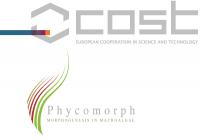Workshops
EPC6 will host three workshops on Wednesday (26 August). Attending any of the workshops is free of charge for delegates of EPC6. We do ask however to register (see below). Registrants to workshops have to register for EPC6, if they intend to attend sessions on Monday, Tuesday, Thursday and/or Friday. There is a daily delegate rate of £150 or £430 (FEPS member) or £480 (non-FEPS member) for all four days. Further information on the precise schedules of the workshops will be communicated by email when available.
PHYCONET - Annual Conference 2015
PHYCONET is a Biotechnology and Biological Sciences Research Council Network in Industrial Biotechnology and Bioenergy (BBSRC NIBB), a UK-based network enabling biologists, engineers and industrial partners to consolidate their knowledge and expertise to unlock the IB potential of microalgae.
The focus of PHYCONET is on producing high value products from microalgae (including cyanobacteria) industrially cultivated in an intensive and controlled manner using photobioreactor and fermentor-based technologies. Our main objectives include developing an interdisciplinary algal research community in the UK, facilitating collaborative research between academia and industry, providing funding for research projects within the network remit, organising conferences and networking and training events and promoting the profile of algal research in the UK.
Our 1st annual conference will feature presentations from PHYCONET members engaged in research funded by our network, as well as providing networking opportunities to foster links within the microalgal community.
Whole day workshop. More info: PHYCONET website
Register by sending an email to: networkmanager@phyconet.org.uk
PHYCOMORPH: advancing basic knowledge on the development and morphogenesis of macroalgae
 The network "PHYCOMORPH: Advancing knowledge on seaweed development and morphogenesis" is funded by the European COST (Cooperation in Science & Technology) Association for 4 years. It will develop an international interdisciplinary platform integrating unique expertise, currently scattered worldwide, to (1) fill basic research gaps on seaweed development and reproduction, and (2) transfer this scientific knowledge to aquaculture end-users to support sustainable seaweed aquaculture. Academic partners highly skilled in seaweed basic research, and RTD and Innovation Institutes dedicated to the transfer of knowledge to end-users, will coordinate and promote research through 4 major scientific tasks:
The network "PHYCOMORPH: Advancing knowledge on seaweed development and morphogenesis" is funded by the European COST (Cooperation in Science & Technology) Association for 4 years. It will develop an international interdisciplinary platform integrating unique expertise, currently scattered worldwide, to (1) fill basic research gaps on seaweed development and reproduction, and (2) transfer this scientific knowledge to aquaculture end-users to support sustainable seaweed aquaculture. Academic partners highly skilled in seaweed basic research, and RTD and Innovation Institutes dedicated to the transfer of knowledge to end-users, will coordinate and promote research through 4 major scientific tasks:
- Identifying how seaweeds become reproductively proficient;
- Defining mechanisms of fertilisation and embryogenesis;
- Studying the kinetics and morphological principles of adult growth
- Developing technical tools to drive Tasks 1-3.
This will be achieved via workshops, short-term scientific missions, training schools and symposia, and deployment of communication tools optimising the transfer from basic research to innovation.
This session is supported by the European COST Association, Action FA1406. The detailed objectives and current composition of the network will be presented during an half day workshop, in conjunction with ALLF. More info: Phycomorph website and COST action.
Register by sending an email to: benedicte.charrier@sb-roscoff.fr
ALFF: Algal Microbiome: Friends or Foes
ALFF, funded under the EU Marie Sklodowska-Curie Initial Training Networks (ITN) programme, is designed to train PhD students within a multinational consortium, whilst significantly improving our understanding of algal-microbial interactions. Controlling the microbial flora associated with algae (the 'algal microbiome') is emerging as the biggest biological challenge for their increased usage of algae in aquaculture and biotechnology. Bacteria can control the morphogenesis of algae, while others are indispensable to algal survival. Pathogens may cause devastating diseases, the impact of which worsens with the intensification of aquaculture practices. ALFF tackles:
- the identification, taxonomy and utilisation of naturally-occurring algal symbionts and pathogens;
- inter- and intra-species signalling and chemical ecology in aquaculture, natural environment and simplified systems (i.e. axenic cultures +/- symbionts); and
- harnesses state of the art genomics, molecular, and biochemical techniques to characterise these interactions.
The workshop will start short pitch presentations of all ALFF PhD projects by the students, followed by an informal joint round table with PHYCOMORPH. This will include short presentations of both networks, and give ample time to discuss algal-microbe interactions and explore new opportunities for collaborations between all participants.
The workshop will take place in the Tower Room of the Linnean Society (Burlington House, London, W1J 0BF, link). The workshop will run from 09:15 to 12:00 (with lunch from 12:00 to 13:00).
Half day workshop in conjunction with PHYCOMORPH. More info: ALLF website
Register by sending an email to: ALFF@sams.ac.uk
- 4680 reads
